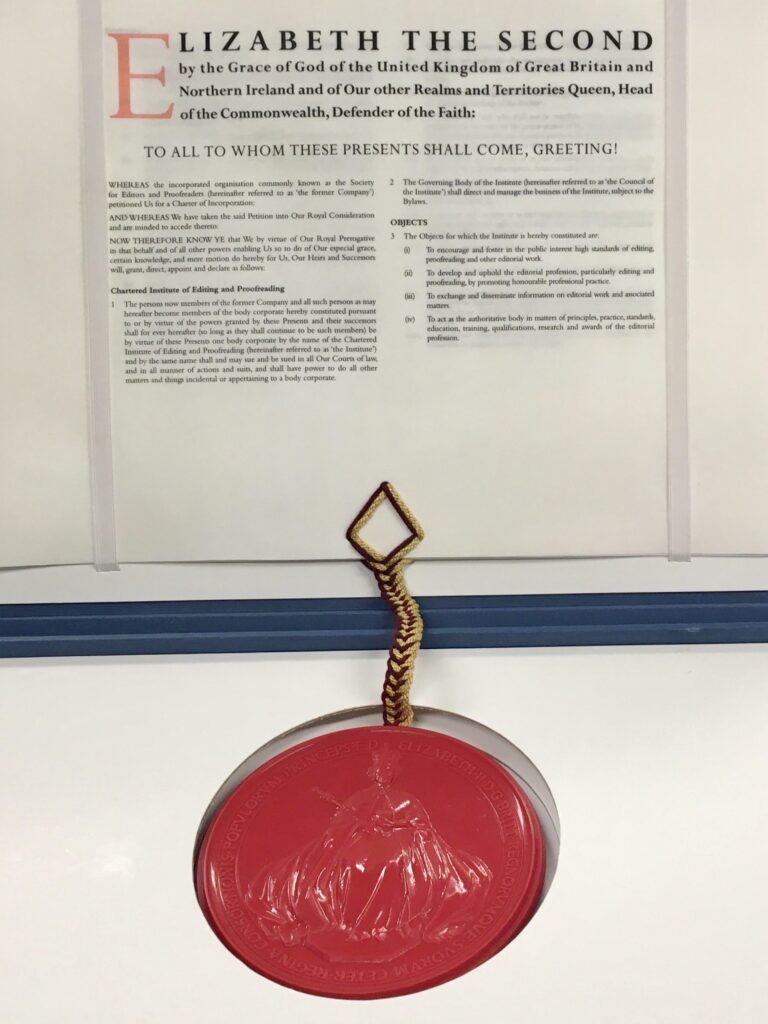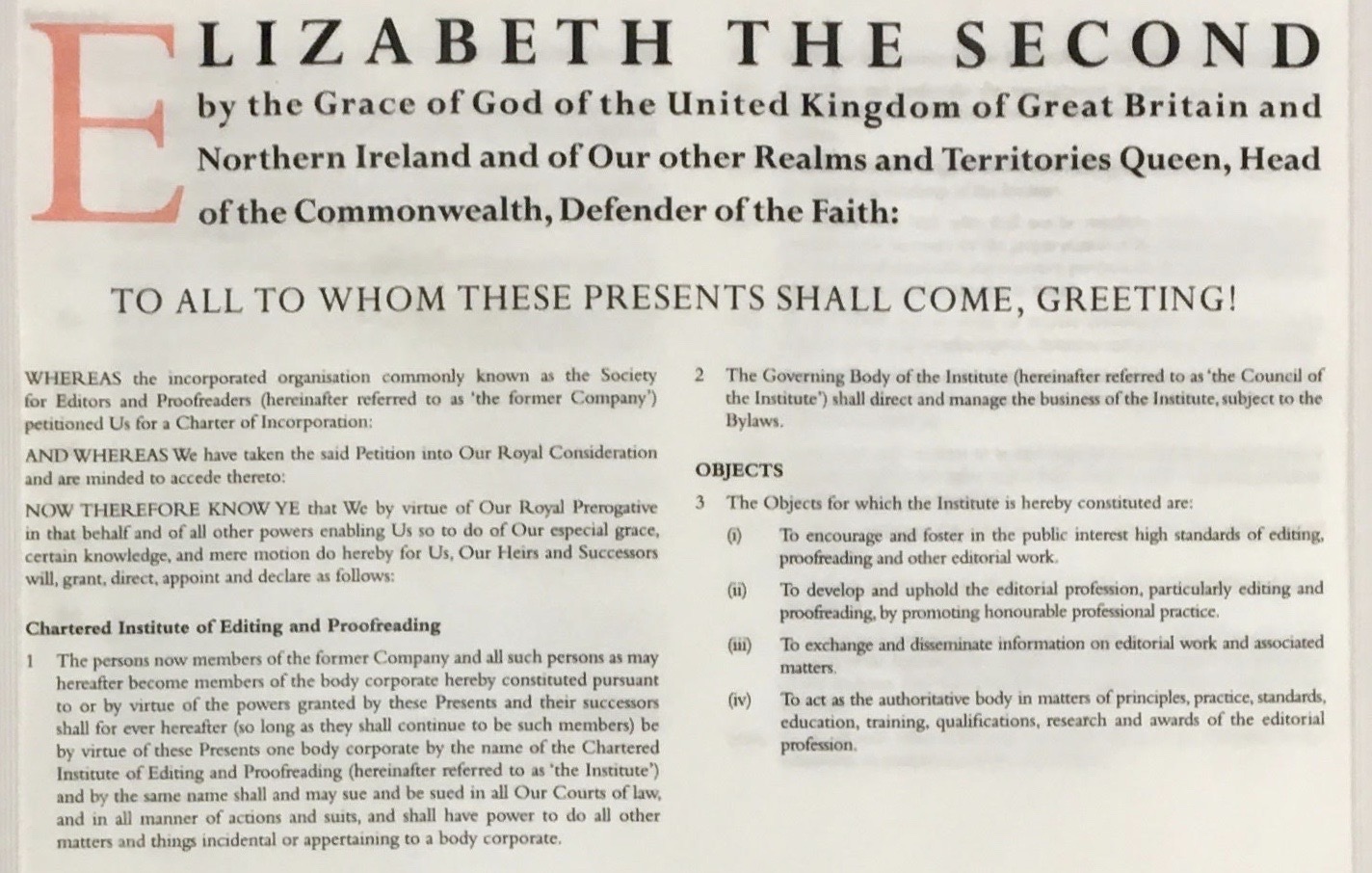Attention to Detail
The Queen’s English
The Society for Editors and Proofreaders (SfEP), established in 1988, was formally recognised by Her Majesty The Queen on 1 March when it was granted the status of chartership for its excellence in upholding standards in the English language. In its new guise it has become the Chartered Institute of Editing and Proofreading (CIEP).
As a membership body, the CIEP gives me a sense of belonging in what otherwise might just be deemed a world of pedants agonising over the placement of punctuation. Whilst this agonising might sometimes be true, the CIEP is more than just a group of people who gather to debate the pros and cons of the Oxford comma. In addition to our annual conference, where we get together to talk about the trade, we also explore throughout the year how the English language is applied in different scenarios and how its use changes over time.
The barbarians are coming!
You might ask why any of these things matter. Indeed, only last December the man responsible for leading the Apostrophe Protection Society made the news because even he felt it was finally time to give up fighting those who seemingly no longer cared about punctuation. Aged 96, John Richards had been campaigning for over twenty years but decided enough was enough. He blamed ‘barbarians’ and accused people of being ignorant and lazy ‘in these modern times’. Whether or not John had a point brings me on to the emergence and growth of ‘text speak’.
#TxtSpk
The highlight for me at last year’s conference was hearing Professor David Crystal speak. Professor Crystal is the CIEP’s honorary president and a world-renowned expert on linguistics. Author of over 100 books on the English language, he says more than 2,000 words have developed out of the digital age – such as ‘blog’, ‘tweet’ and even ‘Google’ – all of which have become established as both nouns and verbs. He believes teenagers read more than ever in this digital age and, even though they tend to shorten words when writing, they have a closer understanding of the way sounds are connected. He goes on to herald the use of hashtags as a useful means of managing, classifying and organising content in a searchable way. Professor Crystal actually suggests middle-aged people are the main culprits of using text speak in messages, as they shorten messages using contractions such as ‘gr8’ and ‘cu l8r’.

Kids and technology
Let me turn to my own daughter, who turned five early in the Covid-19 lockdown. I watched in amazement as she became increasingly tech savvy while undergoing home-schooling. Having never used a laptop before, she quickly learnt how to use the mouse to click, drag and drop while nimbly navigating her way around the keyboard. Like most kids, finding their way around their parents’ phones and tablets is no problem either.
I don’t mean to go off on a tangent here, but it’s important to dispel the myth that technology is dragging down literacy standards amongst our children. Of course, it’s not good practice to allow children to be glued to devices, and especially so at the dinner table, but what’s the difference between people reading the newspaper on their mobile phones or burying their heads in the broadsheets of yesteryear? Looking at the packed train in the picture below, I know which means of reading the ‘paper’ I would rather the person next to me were using.

Who cares about the Queen’s English anyway?
I would argue people of all ages do still care about punctuation. The Queen’s endorsement of the CIEP only serves to highlight the organisation’s beliefs, standards and work. Being granted chartership status was a huge turning point for the organisation. Supporting its PR and Marketing team, I helped the body to think about how it might want to be seen by prospective members and ways in which it could be portrayed more widely. Given the recent news about the dying use of the apostrophe, I asked myself: who cares about the Queen’s English anyway? The answer was right in front of me as I looked at an image of the parchment stamped with the Privy Seal. The answer was The Queen, of course!

Language is constantly evolving
In response to John Richards, I would say the ignorance and laziness apparently present in modern times certainly have not won, but rather, as Professor Crystal puts it, language is constantly evolving. We don’t go around speaking like characters out of a Shakespearean play or from the Poldark series of novels. This is partly what makes linguistics so fascinating; as with everything else, it changes with events and evolves over time. I don’t think the terms ‘lockdown’, ‘social distancing’ and ‘new normal’ have ever been so prevalent in the English language. One might even be tempted to call these times ‘unprecedented’. Events play their part in language evolution.
As an editor and proofreader, my job is to listen to my clients, to establish their needs and to understand their audience. They might wish to strike an informal tone, using conversational text to make a website feel accessible and a business approachable. Or they might require copy to be edited in a highly professional style for an academic journal or medical publication. It is all about setting the right tone. I love the variety of my work. But, whatever the brief, attention to detail for me is of paramount importance.
About the author
Debbie is a member of the Chartered Institute of Editing and Proofreading (CIEP) and takes her professional development seriously. She is a sub-editor and proofreader for publishing company and client Dorson West through which she has worked on numerous titles including Hospital Times, Talent in Logistics, World Manufacturing Journal and Public Policy Projects. She has also provided copywriting services in the education sector. Prior to setting up her own company, Scott Communications, Debbie specialised in Defence advocacy, corporate affairs and political communications.
About the CIEP
The Chartered Institute of Editing and Proofreading (CIEP) is a non-profit body promoting excellence in English language editing. It sets and demonstrates editorial standards and offers a community, training hub and support network for editorial professionals – the people who work to make text accurate, clear and fit for purpose.
This blog post is also published at https://www.linkedin.com/pulse/attention-detail-debbie-scott/.
